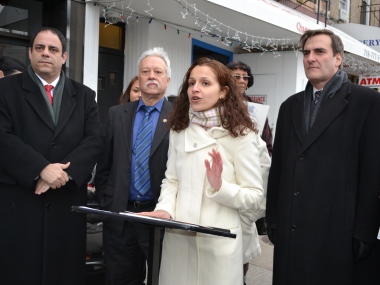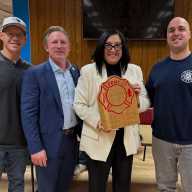The top has come off for one Astoria bikini bar.
Slinking under the guise of a regular lounge, Queen of Hearts’ thinly-veiled attempt to renew its liquor license, without alerting the State Liquor Authority (SLA) that it’s gone nearly-naked, has local leaders drafting legislation to expose them and similarly shady businesses.
Initiated by Assemblymember Aravella Simotas, the Community Full Disclosure Act calls the SLA to improve its application process for obtaining and renewing liquor licenses by demanding businesses remain transparent regarding the exact activities inside the establishment – particularly adult entertainment.
The motion came after Queen of Hearts, at 26-12 Hoyt Avenue South, failed to disclose its status as a bikini bar, masquerading as an ordinary lounge.
“These businesses receive their license to sell alcohol by claiming that they operate as bars and lounges, but behind closed doors they have their employees strip down to their underwear and offer lap or poll dances to their patrons for money,” said Simotas.
Queen of Hearts filed to renew its liquor license with the SLA in September of 2012 under the name Wild Rose.
According to Simotas, institutions are required to disclose name changes and alterations to the style of venue upon reapplication, both of which the owner of the establishment, Steve Hatzilazaridis, failed to do. While forms have a category indicating “topless entertainment,” there is no selection that specifies whether a business plans to feature scantily-clad performers. To the assemblymember, two-inches of fabric do not make a difference.
“We shouldn’t be required to investigate every business that applies for a liquor license,” said Simotas. “The State liquor authority should be obtaining this information, basic information, whether or not they intend to have adult entertainment in their establishment.”
Liquor licenses are reviewed by the local community board, which gives a recommendation to the SLA. Community Board 1 District Manager Lucille Hartmann said she believes the application should not only ask more in depth questions concerning the establishment’s intentions but the SLA should also consider the recommendation of the local community board more seriously.
“It would be very beneficial to all communities if the board and our recommendation had a little more punch and had more of an impact,” said Hartmann.
According to the bar’s lawyer, Peter Stern, Hatzilazaridis failed to disclose to him that they would be adding adult entertainment.
“I didn’t know that they were refiling as a go-go bar. I didn’t know what they were doing in there,” said Stern.
The befuddled attorney, who filed the request to renew but not the original application in July of 2010, said he understood why residents in a neighborhood like Astoria would oppose the installation of an “adult establishment with any kind of erotic behavior.”
Several months ago, a similar skin-centric business, Racks at 19-26 Steinway Street, submitted an application for a liquor license. Simotas said she was perplexed as to why controversial establishments continued to pop up in a residential neighborhood.
“The only rationale is the Community Board isn’t getting the information it needs to properly scrutinize each application,” said Simotas. “The Community Board should not have to go investigate. They shouldn’t have to go knock down the door and find the owner. That information should be right up front.”
RECOMMENDED STORIES
- The Who gifts sound system to Sandy-struck venue
- Bud’s Ale House replaces Hooters in Fresh Meadows
- Queens businesses fear 7 subway suspension may hurt profits






























